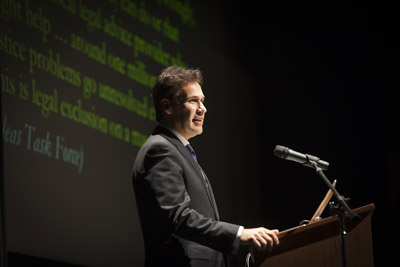Conference celebrates free Web access to the law
By Judith Pratt

About 250 people from 37 countries gathered at Cornell Law School to discuss free access to law when Cornell's Legal Information Institute (LII) hosted the international Law Via the Internet (LVI) conference, Oct. 7-9. It marked the first time LVI has been held in the United States and recognized the LII's 20th anniversary.
When Peter W. Martin, the Jane M.G. Foster Professor of Law Emeritus and former dean, and Thomas R. Bruce, LII director, founded the institute in 1992, free access to law meant putting a few court cases on the newly available Internet. Welcoming the conference-goers, Cornell Law Dean Stewart Schwab said that Martin and Bruce had no idea how their concept would grow.
Now, he noted, the LII accounts for 65 percent of Cornell's Web traffic, with 14 million visitors a year. Regulations, laws and court cases are available online on 40 LII namesake websites and dozens of commercial sites.
Forty countries have subscribed to the Declaration of Free Access to Law, but making law accessible has grown in complexity. In developed countries, online technology changes daily. In developing countries, just getting at the laws can be challenging.
Presenters from Kenya, Uganda, Malawi, Swaziland, the Seychelles, Sierra Leone, Nigeria and South Africa shared their experiences in creating legal information institutes. As Ufuoma Lamikanra of the Nigerian Institute for Advanced Legal Studies said, their task is "expensive, difficult and time consuming." However, Thelma Julie of the Seychelles Legal Information Institute noted that their difficulties "draw attention to failings of the system."
Even wealthy countries need more affordable legal service. In his keynote speech, "Liberating Law Yet Further," Sir Richard Susskind, information technology adviser to England's Lord Chief Justice, said that in England, many people who need legal help don't look for it because they see the law as intimidating and expensive.
The second keynote speaker, Clay Shirky of New York University, speaking on "Authority in an Age of Open Access," said law must not only be accessible, it must be comprehensible. And collaborative annotation, while controversial, makes things understandable. He described an attempt by physicians to counteract Wikipedia articles on medicine. However, Shirky said, Wikipedia's collaborative, nonexpert approach created stronger, more detailed and clearer information.
At the LVI-2012 gala dinner, Martin recalled the original LII startup proposal, which "declared the beginning of a five-year program, encompassing both publication of important U.S. statutes on disk and experimentation with use of the Internet as a mode of electronic publication and exchange."
Martin and Bruce did not anticipate the pace, scope or longevity of those experiments. "They were a consequence, in part, of our being in the right place at the right time, but also of our response to subsequent developments and discoveries; choices we made concerning audience, direction and scale."
Bruce addressed two developments that could affect delivery of primary legal materials in the next 20 years: the Semantic Web (a collaborative movement led by the World Wide Web Consortium) and gaining a greater understanding of how the LII's materials are used. Of the Semantic Web, Bruce noted: "We can now store and access huge numbers of statements quickly and cheaply, and we can use these techniques to make the law accessible as well as available. Anyone can say anything about anything. What will they say about what the law is? How can that make it easier for people to find and understand it?"
At the conclusion of the gala, Schwab presented Martin and Bruce with commemorative sculptures that read: "Your vision, generosity and dedication continue to further the rights of all people to know and understand the laws that govern them, without cost."
Videos of the conference are available online.
Judith Pratt is a freelance writer for the Law School.
Media Contact
Get Cornell news delivered right to your inbox.
Subscribe